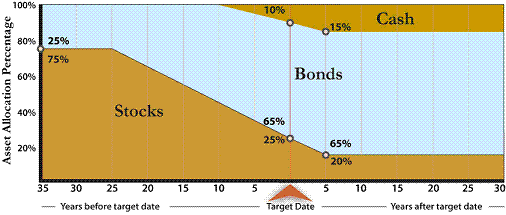Well let's look at a scenario. You're 45 and you know that you want to retire at 65. So you have twenty more years to work and save. These funds won't give the amount that you need to have now and also to save in the future, that needs to be figured out by you and your financial planner.
Instead what these funds do is slowly and automatically move your money away from stocks and into bonds. By the time you retire at 65, the general rule of thumb is that you need to have 65% of your money in bonds, some in cash and the rest in the stock market. Each fund probably has a different ratio but generally it'll be better than how most people do it. Which is to throw money blindly at the stock market and see what happens.
These funds will have dates associated with them like '2050' for those who plan to retire in 2050. If you're 35 now and plan to retire at 65, then your retirement date fund will be 2044. If you can't find one with your date then just pick the closest year. Be very very leery of cost. Go with the lowest operating cost funds. Most are going to be investing in about the same things so over time the returns will be very similar.
If you hate mutual funds and you want to do it yourself than you can. It's quite simple. Just keep whatever age you are in bonds as a percentage of your entire portfolio. So if you're 50 years old than 50% of your retirement funds should be in bonds. If you're 40, than 40% should be. When you turn 60, you probably should keep 5% in cash, 60% in bonds, and the rest in an index fund. Reallocate your funds at the same time each year. It doesn't matter when.
This approach won't maximize your return, but it will come as close as possible to guaranteeing that you have funds for your retirement will a reasonable amount of risk. Don't be like these poor bastards who had everything in their retirement accounts all in stocks and then wake up to a crashed stock market without a pot to piss in!
It happens every stock market crash. Don't let it happen to you!



 RSS Feed
RSS Feed
